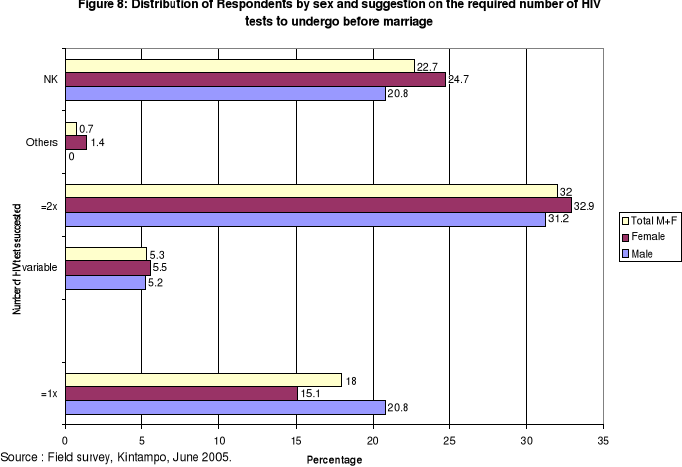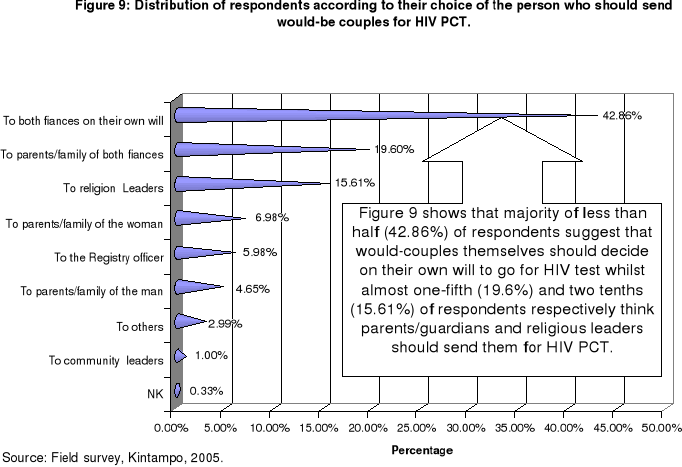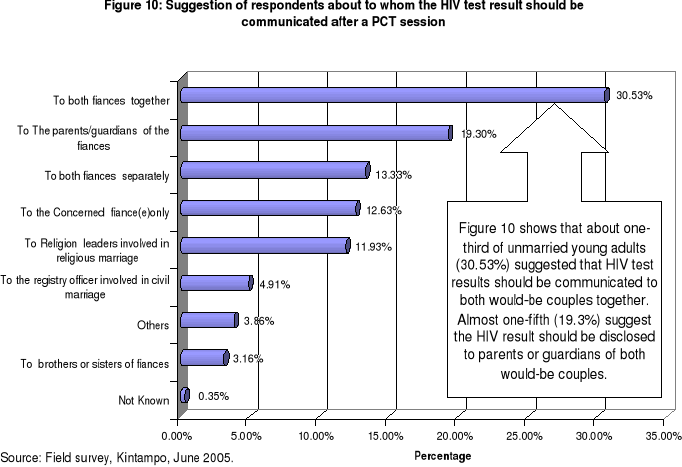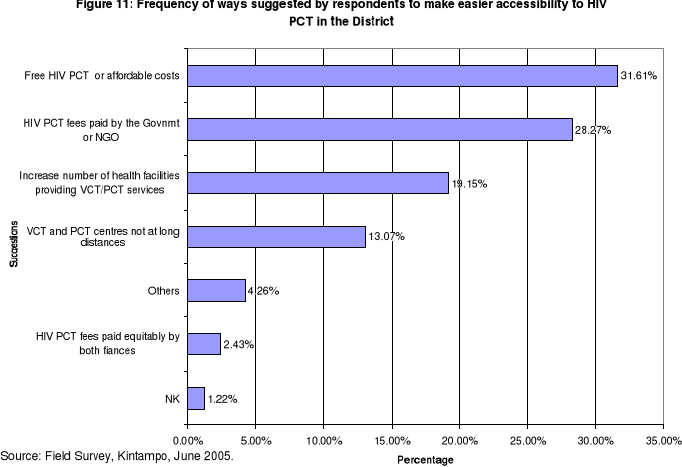4.3.2. 4.13.1. VIEWS ON FREQUENCY OF HIV
TEST BEFORE MARRIAGE
AMONG WOULD-BE
COUPLES
Figure 8 below shows that a third of respondents in both sexes
suggested the HIV test should be done at least twice before marriage, with 3-6
months interval between two tests. Almost one fifth of respondents in both
sexes suggested HIV test should be done just once 2-3 months before marriage.
Another fifth suggested it should be done at least once, without specifying the
maximum number of tests. Few respondents also thought the frequency of HIV
tests should vary depending on the length of the engagement/marriage period.
We have to also note that almost one fifth of respondents did
not know (NK) any answer at all, possibly because of lack of knowledge.

The same trend of answers was also shown in qualitative
study.
|
«HIV Test should be done 3 times before
marriage, with 3 months interval between two tests, given the window
period»(IDI: Counselor & Matron /Kintampo District
Hospital)
|
|
«It is better they undergo a minimum of 3 tests, the
first one is preliminary, the second is the control test and then the third one
is a confirmation test, with 3 months interval between 2 tests. I haven't
received a couple who did more than one test, but we advise them about the
necessity of doing 3 tests before marriage.»
(IDI: Lab Technician/ Kintampo District Hospital, Picture
No 10)
|
|
|
«It should be More than once because supposing you
get it now, if you test now it may be negative while it may convert to
positivity 3 months later due to the window period. That is even why we start
our counseling sessions earlier at least 3 months prior to marriage so that
couples who are willing to do HIV testing can do it at least twice before
getting married»
(IDI: Rev Pastor Methodist Church/Kintampo)
|
4.13.2. VIEWS OF RESPONDENTS ON WHO SHOULD SEND
WOULD-BE
COUPLES AT THE HOSPITAL FOR
HIV PCT

4.3.3. 4.13.3. VIEWS OF RESPONDENTS ON
WHO THE HIV TEST RESULT SHOULD
BE COMMUNICATED TO
AFTER A PCT SESSION

4.13.4. WAYS TO PROMOTE HIV PCT IN K'PO
DISTRICT
From Table 15 below the totality of respondents (100%)
recommended that other required premarital tests should be added to HIV test in
order to reduce stigma associated to HIV/AIDS, especially when HIV test is done
solely.
|
Table 15: Suggestions from respondents on ways to
promote HIV PCT in Kintampo District
|
|
N0
|
Ways and means suggested by respondents
|
Yes
(%)
|
No
(%)
|
NK
(%)
|
|
1
|
There should be a specific law (decree-law) on premarital
examinations in Ghana
|
135
(90.6)
|
14
(9.4)
|
-
|
|
2
|
PCT should be clearly mentioned in the health reproductive
policies of Ghana
|
145
(96.7)
|
5
(3.3)
|
-
|
|
3
|
Mass sensitization campaigns about PCT through durbars,
Radio/TV, news papers, churches/mosques, NGO, asso- ciations, clubs, schools
& university, Hotels, hospitals etc
|
149
(99.3)
|
1
(0.7)
|
-
|
|
4
|
Open discussions on Youth sexual education about HIV-AIDS and
PCT in youth durbars such as sports...
|
149
(99.3)
|
1
(0.7)
|
-
|
|
5
|
PCT should be taught in the health education &
reproduction matters in school
|
146
(97.3)
|
4
(2.7)
|
-
|
|
6
|
Churches and mosques should teach PCT to young couple before
marriage
|
149
(99.3)
|
1
(0.7)
|
-
|
|
7
|
Strictly prohibit all marriage (be it civil, religious or
traditional) before PCT, through a decree law
|
118
(79.2)
|
31
(20.8)
|
-
|
|
8
|
Strictly recommend a prenuptial medical certificate from the
doctor for each fiancé before celebration of marriage
|
140
(93.3)
|
9
(6.0)
|
1
(0.7)
|
|
9
|
Providing care and support services for people living with
HIV/AIDS
|
144
(96.0)
|
6
(4.0)
|
-
|
|
10
|
Reducing stigma and discrimination against people living with
HIV/AIDS
|
136
(90.7)
|
14
(9.3)
|
-
|
|
11
|
Creating youth HIV associations/clubs like Virgin club etc
|
139
(92.7)
|
11
(7.3)
|
-
|
|
12
|
Add other premarital required tests to reduce stigma
associated to HIV
|
150
(100)
|
-
|
-
|
|
13
|
Encouragement by providing free treatment for any other
diseases detected among those would-be couples who come for HIV PCT.
|
145
(97.3)
|
4
(2.7)
|
-
|
|
14
|
Others (PCT before pride price is paid, quoting that couple
did PCT during marriage ceremony, PCT film/posters....)
|
49
(32.9)
|
90
(60.4)
|
10
(6.7)
|
|
Source: Field survey, Kintampo, June 2005.
|
These findings correspond to opinions of participants in FGD
and IDI.
|
«Even when premarital examinations are
carried out, the emphasis is only on HIV/AIDS and one forgets about many other
diseases requiring genetic counseling, and family planning is not part of it.
There should be a policy that defines the package of required premarital tests.
The policy should insist that no marriages should take place unless couples
undertake an examination, and it should also include counseling on family
planning. Such policy will definitely promote HIV PCT in Kintampo and in the
whole nation.» (IDI: Public Health Nurse & In charge of Family Health
Clinic /Kintampo).
|
4.13.5. WAYS TO CREATE EASIER ACCESSIBILITY TO HIV
PCT
IN KINTAMPO
DISTRICT

Findings in Figure 11 shows that majority of respondents
(59.88%) suggested that HIV PCT services should be free or set at affordable
cost or paid by the government or any charity NGO in order to make HIV PCT
services accessible to young people. One fifth of respondents also suggested
that the number of health facilities providing HIV PCT services should be
increased, one tenth saying VCT/PCT centres should be put within the community
not at long distances.
These suggestions also meet the opinion of participants in FGD
and IDI.
|
«Past experience has shown many people would
voluntarily undergo HIV test if it is free. In fact in 2004, Ghana Social
Marketing Foundation came in Kintampo to recruit 100 people for free VCT. It
was a 7-day-casual VCT session based at Motor Union/G.P.R.T.U-Kintampo. Within
7 days they were able to get about 96 persons of whom 6 tested HIV positive.
Therefore I believe young people will patronize HIV premarital testing if it is
made free».
IDI: District HIV/AIDS response Initiative
coordinator/DA-GES/Kintampo.
|
Some of the participants even linked the accessibility to HIV
PCT to the District Mutual Health Insurance Scheme (DMHIS):
|
«Some one may want to do HIV PCT but doesn't
get money for it. So everybody should register for DMHIS to have easier access
to HIV PCT. HIV PCT should be announced to the public as part of services to be
covered by the DMHIS».
(IDI: Rev. Pastor,Ampoma Village)
|
4.13.6. WAYS TO MAKE HIV PCT MORE EFFECTIVE,
ACCEPTABLE AND
ATTRACTIVE FOR YOUNG PEOPLE IN
KINTAMPO DISTRICT
Table 16 below regroups all measures that respondents
suggested for the HIV PCT to be more acceptable and attractive to them. Some of
these measures were suggested by the large majority of respondents (e.g.
Guarantee complete confidentiality and privacy ) etc. The suggestions implied
certain interventions to be put in place so that people are attracted by the
service (see Discussion, point 4.7.6 and Figure 15).
|
Table 16 : Suggestions for the HIV PCT practice to be more
effective, acceptable and attractive to unmarried young people in Kintampo
district
|
|
N°
|
Ways to make HIV PCT more effective
|
Yes (%)
|
No
(%)
|
NK
(%)
|
|
1
|
Provide for unbiased, clear and non-judgmental advices to
would-be couples
|
139
(92.7)
|
10
(6.7)
|
1
(0.7)
|
|
2
|
Guarantee complete confidentiality and privacy
|
149
(99.9)
|
1
(0.7)
|
-
|
|
3
|
Secure permission of patients before passing on information to
anybody (parents, pastors/bishop, Imam and other care providers..)
|
142
(94.7)
|
8
(5.3)
|
-
|
|
4
|
Provide permanent caring and support services
|
147
(98.0)
|
3
(2.00)
|
-
|
|
5
|
Examiner/counselor of the same sex as the client
|
127
(84.7)
|
22
(14.7)
|
1
(0.7)
|
|
6
|
To be counseled by knowledgeable, well trained, kind, wise and
good communicator examiner/counselors
|
145
(96.7)
|
5
(3.3)
|
-
|
|
7
|
To be counseled by counselors not known in the area and change
continuously the old counselors by new ones after a certain period.
|
135
(90)
|
14
(9.3)
|
1
(0.7)
|
|
8
|
Follow up of fiancés / newly married is done after HIV
PCT
|
132
(88.6)
|
15
(10.1)
|
2
(1.3)
|
|
N°
|
Ways to make HIV PCT more effective
(Continued)
|
Yes (%)
|
No
(%)
|
NK
(%)
|
|
9
|
Provide for the presentation of test results as soon as
possible, to reduce the anxiety of waiting to long (same day result)
|
141
(94.0)
|
7
(4.7)
|
2
(1.3)
|
|
10
|
Affordable cost or free HIV PCT examinations
|
147
(98)
|
3
(2.0)
|
-
|
|
11
|
To be counseled by young adults counselors
|
99
(66.0)
|
51
(34.0)
|
-
|
|
12
|
More than one counseling session is provided to the
fiancés
|
126
(84.0)
|
23
(15.3)
|
1
(0.7)
|
|
13
|
When there will be a treatment or effective cure for
HIV/AIDS
|
140
(94.0)
|
9
(6.0)
|
-
|
|
14
|
Provide entertainment in VCT/PCT centres
|
136
(90.7)
|
14
(9.3)
|
-
|
|
15
|
Others (give marriage gifts to would-be couples who come for
HIV PCT, quote it in marriage ceremony...)
|
42
(28.0)
|
108
(72.0)
|
-
|
|
Source: Field survey, Kintampo, June 2005.
|
4.13.7. HEALTH FACILITIES WHERE HIV PCT CENTRE SHOULD
BE ESTABLISHED IN KINTAMPO
DISTRICT
|
Table 17: Health facilities where respondents suggest
HIV PCT services to be established
|
|
|
Health Facilities
|
|
Sub-District
|
K'po District Hospital (%)
|
Jema Health centre
(%)
|
Anyima Health centre
(%)
|
New Longoro H.Centre
(%)
|
Busuama Health centre
(%)
|
In any one of fac.in the Dist. (%)
|
In all the H.
Facilities
(%)
|
TOTAL
|
|
Kintampo
|
76 (93.8)
|
0 (0)
|
1(1.2)
|
0 (0)
|
0 (0)
|
1 (1.2)
|
3 (3.7)
|
81 (100)
|
|
Jema
|
10 (24.4)
|
31 (75.6)
|
0 (0)
|
0 (0)
|
0 (0)
|
0 (0)
|
0 (0)
|
41 (100)
|
|
New Longoro
|
22 (78.6)
|
0 (0)
|
0 (0)
|
2 (7.1)
|
1(3.6)
|
0 (0)
|
3 (10.7)
|
28 (100)
|
|
TOTAL
|
108 (72)
|
31 (20.7)
|
1 (0.7)
|
2 (1.3)
|
1 (0.7)
|
1 (0.7)
|
6 (4)
|
150 (100)
|
|
Source: Field Survey, Kintampo, June 2005.
|
Table 17 shows that majority (72%) of respondents suggested
HIV PCT services should be established in Kintampo District Hospital (KDH).
Also it is noted that majority of respondents from Jema Sub-district (75.6%)
chose Jema health centre for the HIV/PCT service to be implemented. Majority of
respondents from New Longoro Sub-District quoted KDH rather than their health
centre as the site for the HIV PCT centre.
4.14. POSSIBLE DECISIONS THAT WOULD-BE COUPLES ARE
MORE LIKELY
TO MAKE GIVEN DIFFERENT SCENARIOS OF HIV
TEST RESULTS.
Respondents were asked to give their likely decisions on
marriage given assumptions of possible HIV tests results in different
scenarios.
Figure 12 below shows that majority of respondents (94.7%)
would definitely decide to break the marriage relationship and choose another
healthy partner in case their fiancé(e)s test HIV positive after a PCT
session. The break up of marriage relationship would also be decided by the
majority of respondents (90.0%) who themselves test HIV positive while their
would-be partners are HIV negative.
|
|
Source: Field survey, Kintampo, June 2005
|
|
Decision 1: Marry but abandon childbearing (permanent
contraception) + protected sex
(condom) throughout the life
Decision 2: Marry but abandon childbearing (permanent
contraception), adopt children +
protected sex (condom) throughout the
life
Decision 3: Marry but limit childbearing with PMTCT of HIV
throughout the life for all
Pregnancies and breastfeeding.
Decision 4: Break up of engagement/marriage relationship and
search/choice of an other
healthy fiancé(e)
Decision 5: None of them, I will still marry her/him , have
unprotected sex and bear
children irrespective of all advices,
because I love her/him and marriage is
for the best and the worst.
Others : Others undefined decision.
NEG vs. POS: The respondent is negative whereas the
fiancé(e) tests HIV positive.
POS vs. NEG: The respondent tests positive whereas his/her
fiancé(e) is HIV negative
POS vs. POS: Both fiancé(s) test HIV Positive.
|
However in the third scenarios of both fiancé(s) being
HIV positive, opinions diverged greatly: one third (34.7%) chose decision 1,
followed by one fourth choosing decision 5 (23.3%), and one fifth (16%)
choosing decision 3. This trend meets views of participants in both IDI and
FGD.
4.15. POINTS OF VIEW OF RESPONDENTS ABOUT MARRIAGE
BETWEEN
DISCORDANTS COUPLES AND HIV INFECTED
COUPLES
Figure 13 below shows that majority of
respondent (64%) opted that marriage between discordant couples should not be
permitted versus a fifth (19.3%) saying such marriage should be permitted only
under certain protective precautionary measures such as permanent condom use,
limitation of childbearing, PMTCT etc.Their views greatly diverged about
marriage between both infected partners, majority of less than half (44.7%)
saying it should be permitted under certain protective measures and another
considerable proportion (41.3%) saying such marriage could be permitted
provided would-be couples and or their parents/families agree with it.
In either case it should be noted that only few respondents
(0-2.7%) put consideration on the agreement by the religion bodies for such
marriage to be conducted.
|
|
Source: Field survey, Kintampo, June 2005
|
|
Pv1: Such marriage should be permitted only under certain
protective precautions given to the couple by the doctors.
Pv2: Such marriage should not be permitted.
Pv3: No matter if the two fiancé(s) agree to marry
Pv4: No matter if the religious leaders agree with the
marriage.
Pv5: No matter if the parents/families of both
fiancé(s) agree with the marriage. NK: Don't Know.
|
The entire trend here above meets the opinions observed among
participants in FGDs and IDI.
|
«Would-be couples who are both HIV positive
should marry so that they wouldn't transmit it outside to others. But in
couples where only one tests positive, marriage should be canceled because it
is impossible for them to use condom throughout their life if they
marry».(A 38-year-old mother: FGD of Moslem mothers)
|
|
« No marriage when one tests HIV positive.
But for infected couples, they can console themselves to still marry, hoping
may be one day doctors will find vaccine or a drug for them to get treated
while still living and enjoy the little they could enjoy. After all they are
human being with the equal right of enjoyment».
(A 39-year-old men: FGD of Moslem
Father).
|
|
«.... Uuummmh, well!. In marriage matter
normally the last decision belongs to the couples. When although the fact that
one of them is HIV sero positive, the other partner still say he/she will still
marry him/her, that marriage could be celebrated. It is not my responsibility
to deny the right of people to marriage.....But I would really hesitate to
marry them...Pastor laughing...., knowing I am contributing to let AIDS protect
them soon in their grave." «IDI: Rev Pastor Methodist
church/Kintampo»
|
|
«Both discordant couples and infected ones
should not marry. It is not a matter of just blessing their union. What about
their future? Who will take care of their orphans and widows/widowers?
Counselors could counsel them to get rid of marriage so that they live longer.
I am sorry, It is not stigmatization; just understand the situation which will
change only when the vaccine or drug of HIV will be
found.»
(A 23- year-old boy and KHRC field worker: FGD
unmarried boys/girls of mix religious background).
|
|
«Normally both discordant couples and
infected couples shouldn't be allowed to marry, given the fact that they would
not be able to cope with all the precautions required. Such marriages favor
birth of infected children, most of who would become orphans or also transmit
it to others. We have to stop people with blind love to destroy new generations
with innocently HIV infected children.»(IDI: Counselor/KDH, Picture No
11)
|
|
| 


